Registered Nurse Resume Examples & Writing Tips for 2025

Jul 18, 2024
|
12 min read
Let’s get your resume looking good, STAT!
Rated by 348 people
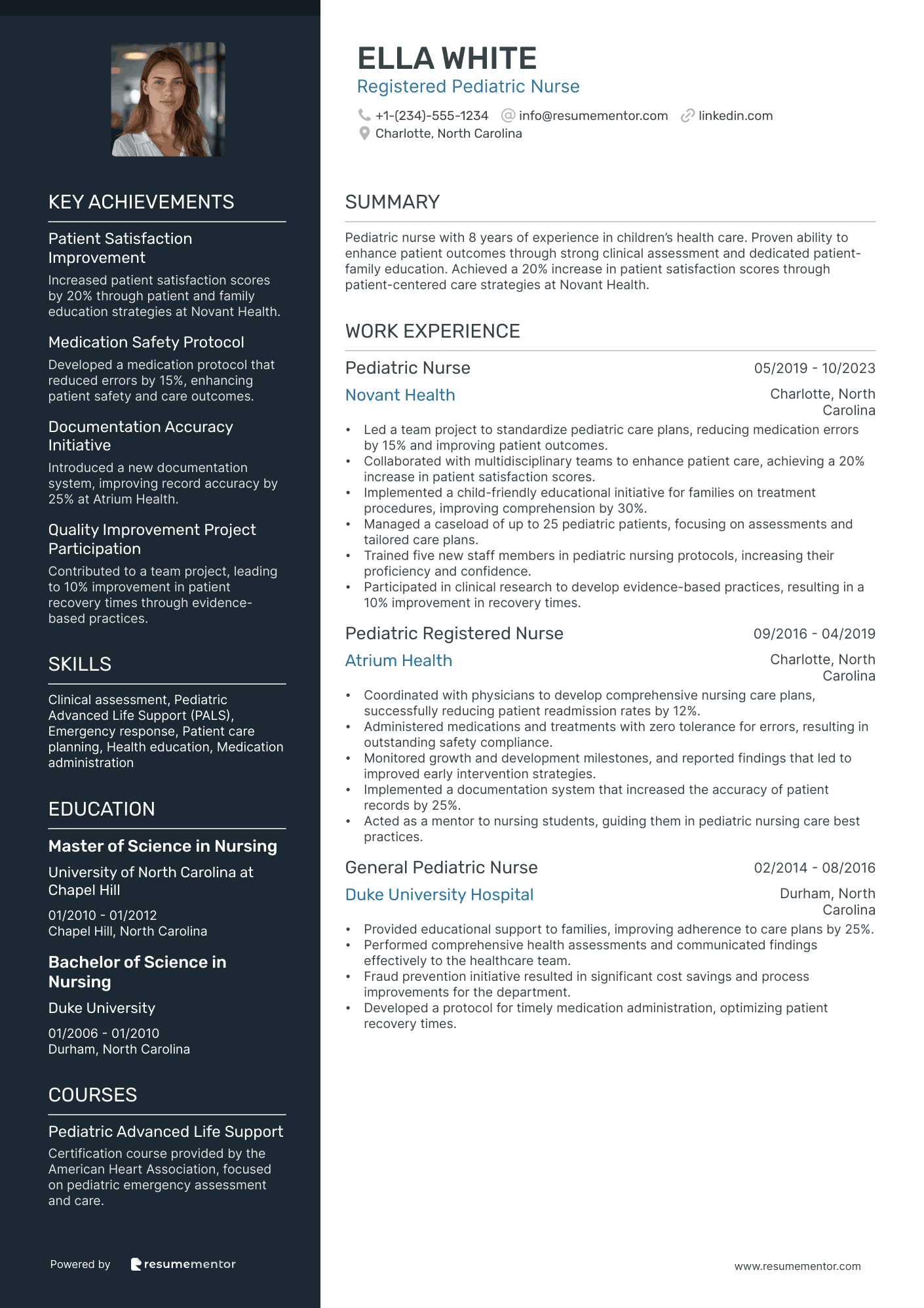
Registered Pediatric Nurse
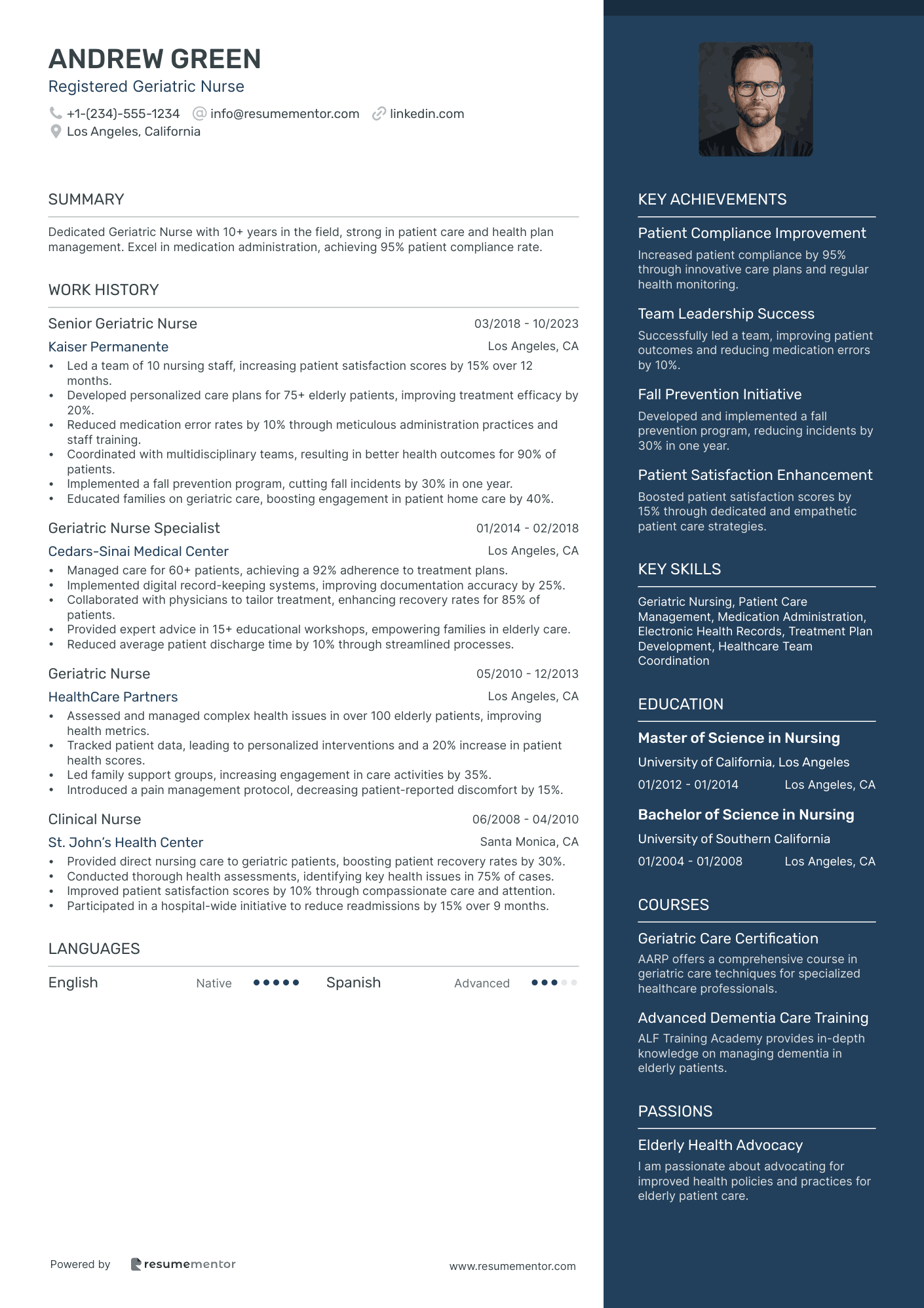
Registered Geriatric Nurse
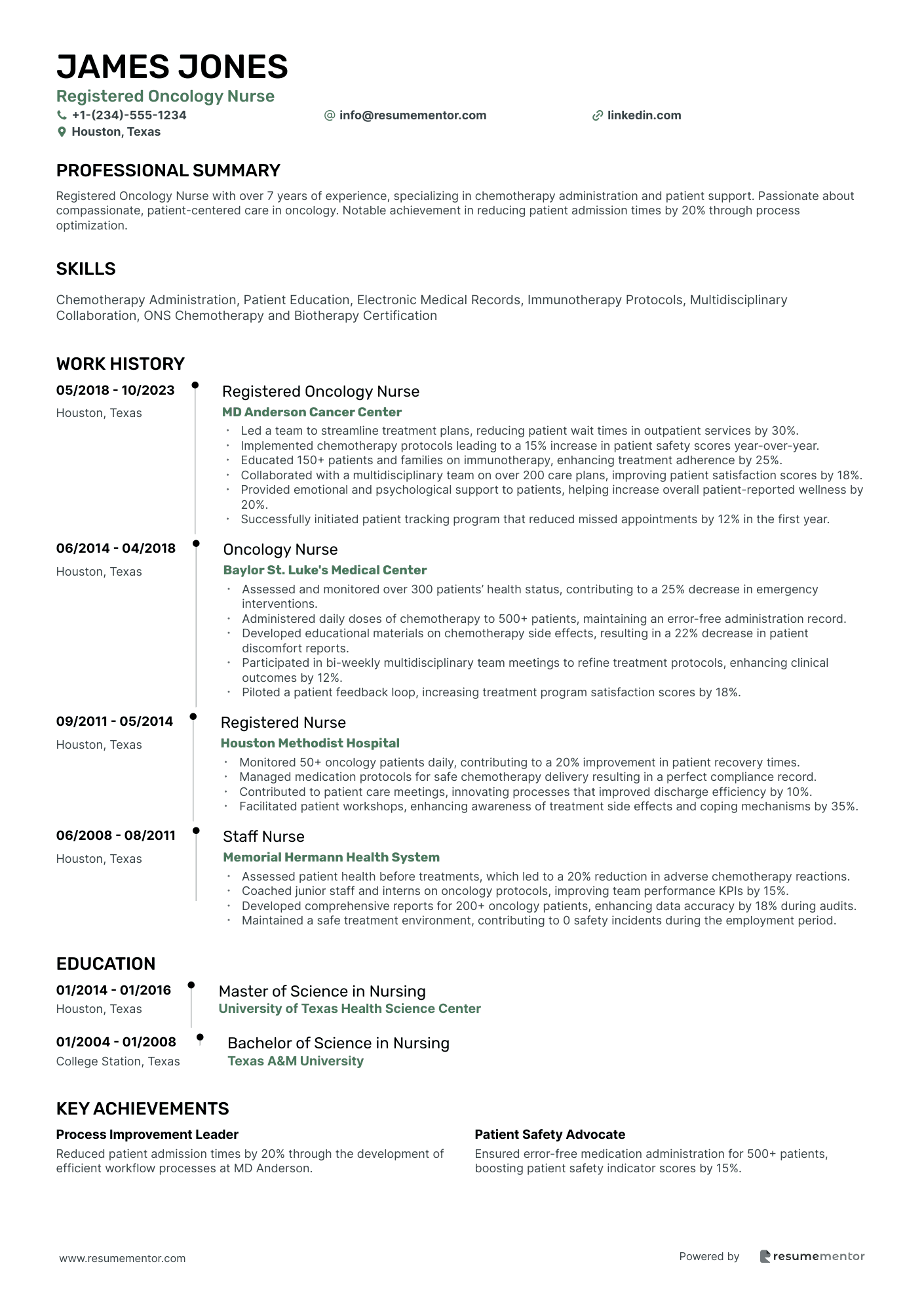
Registered Oncology Nurse
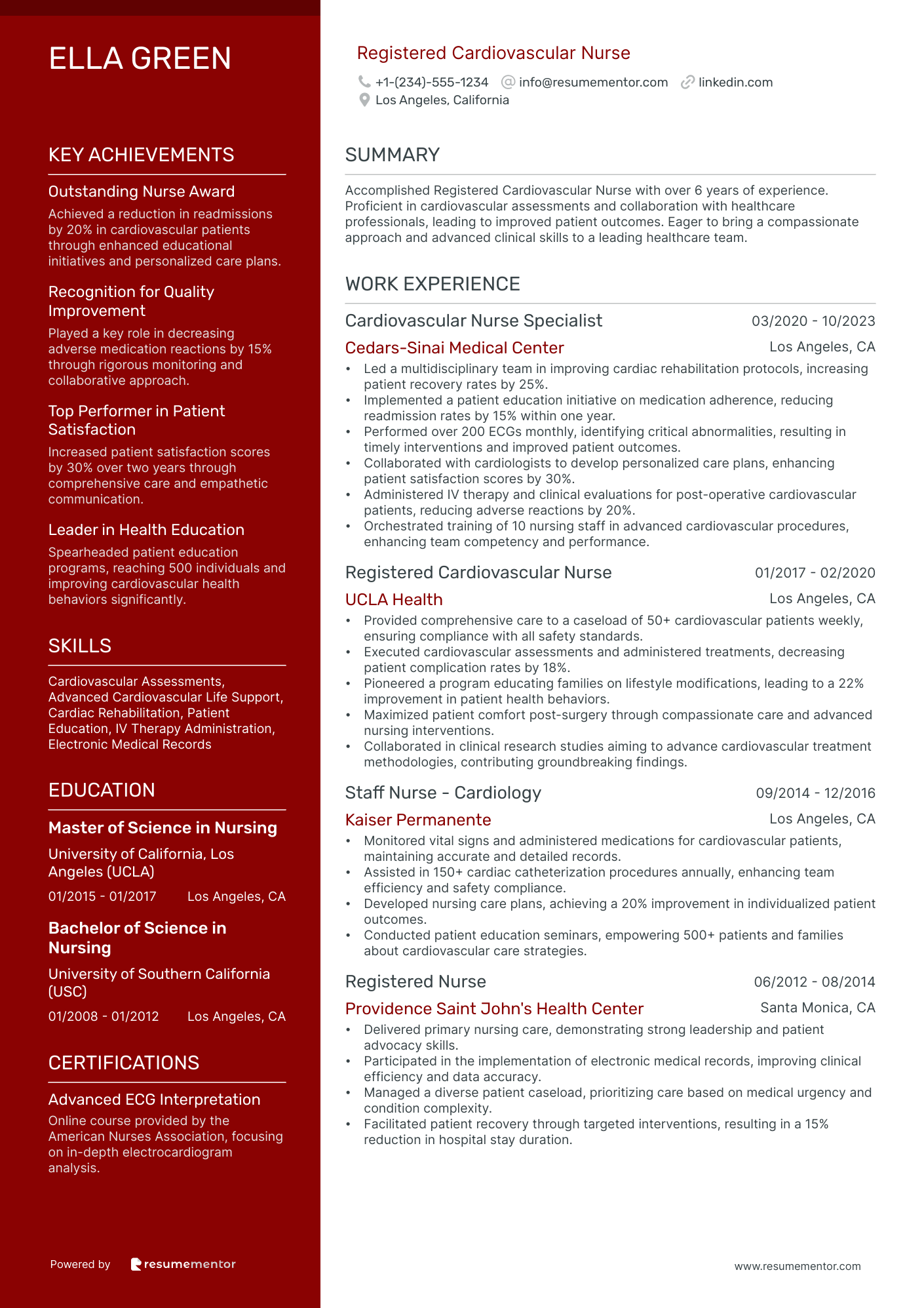
Registered Cardiovascular Nurse
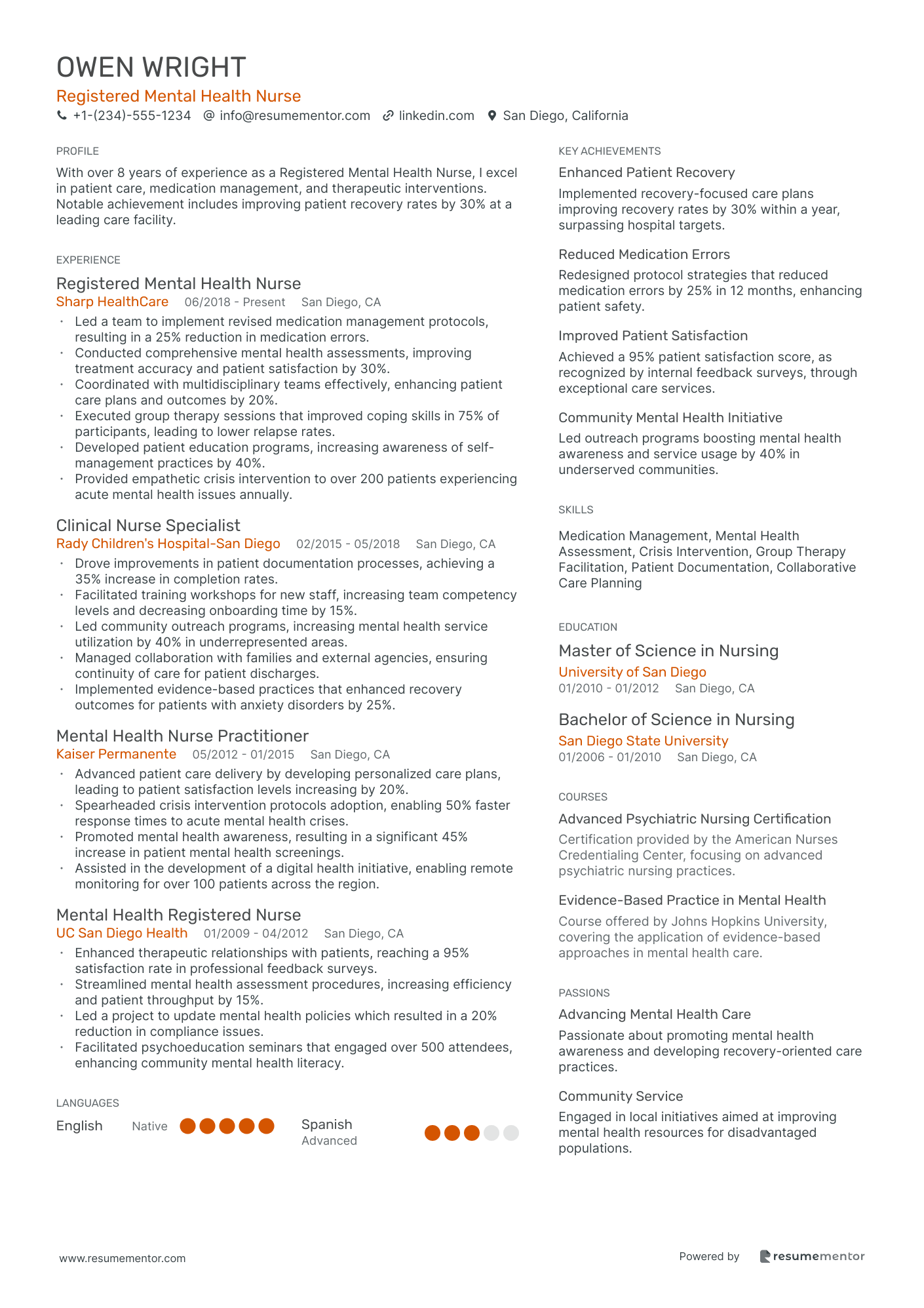
Registered Mental Health Nurse
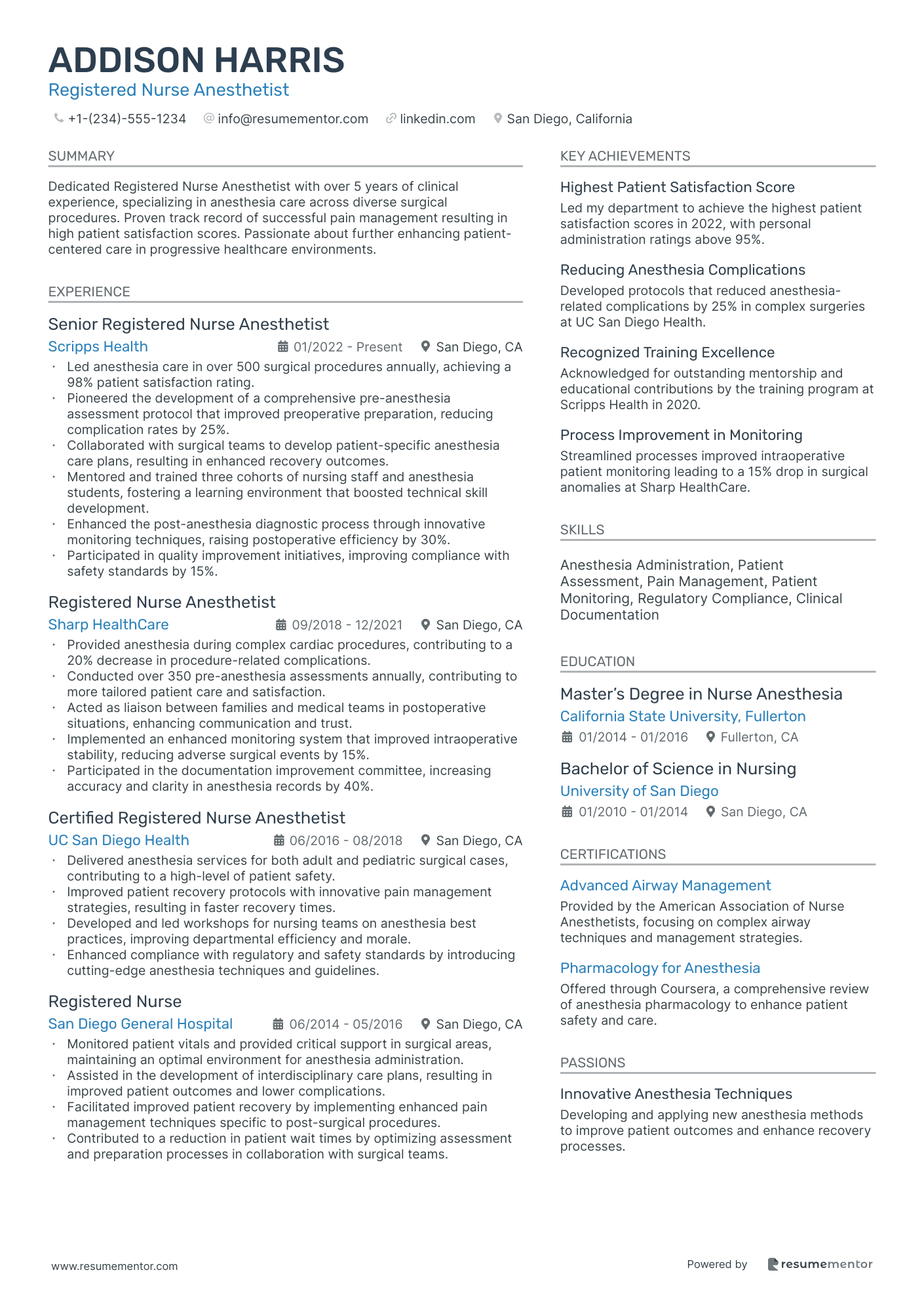
Registered Nurse Anesthetist
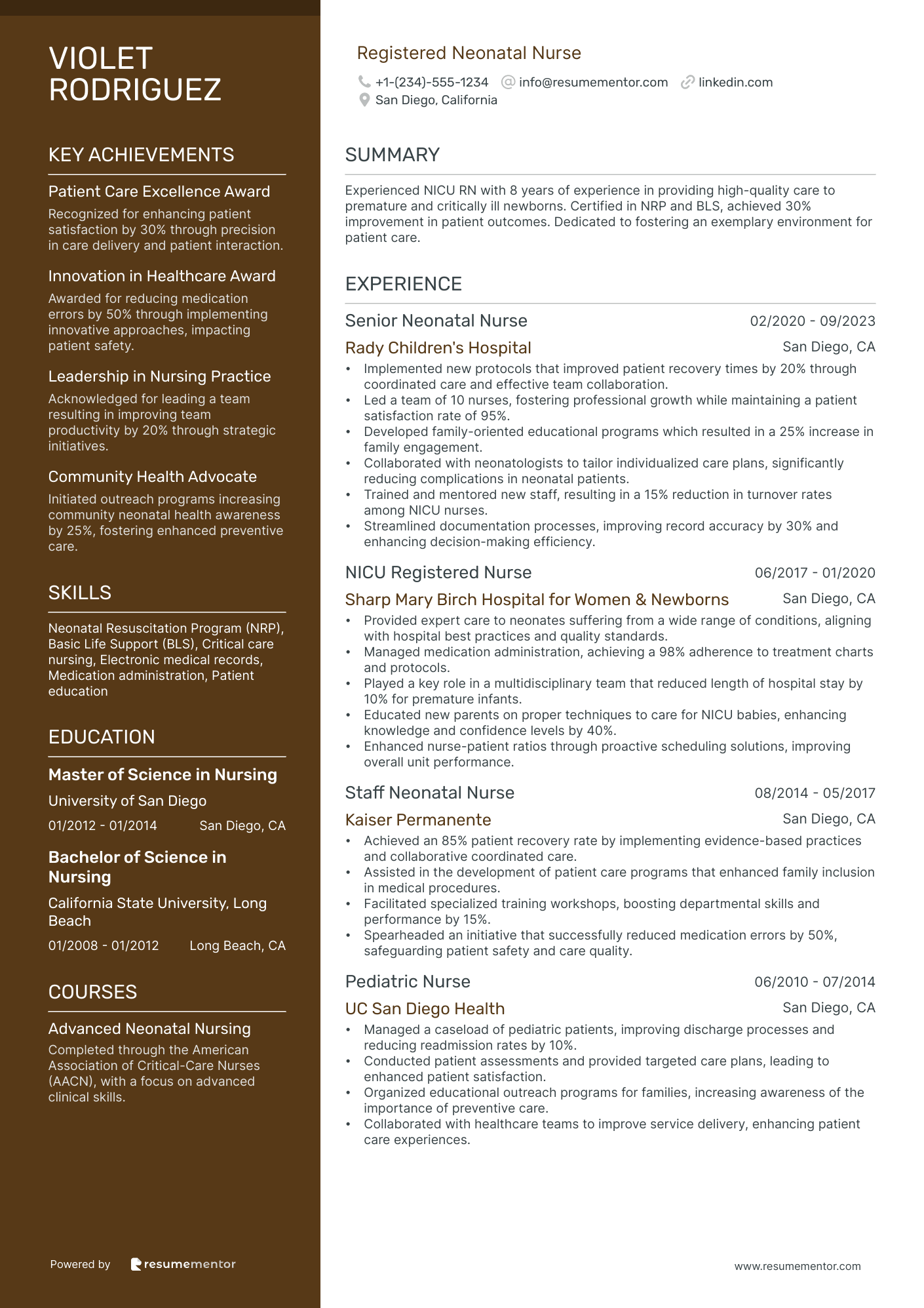
Registered Neonatal Nurse
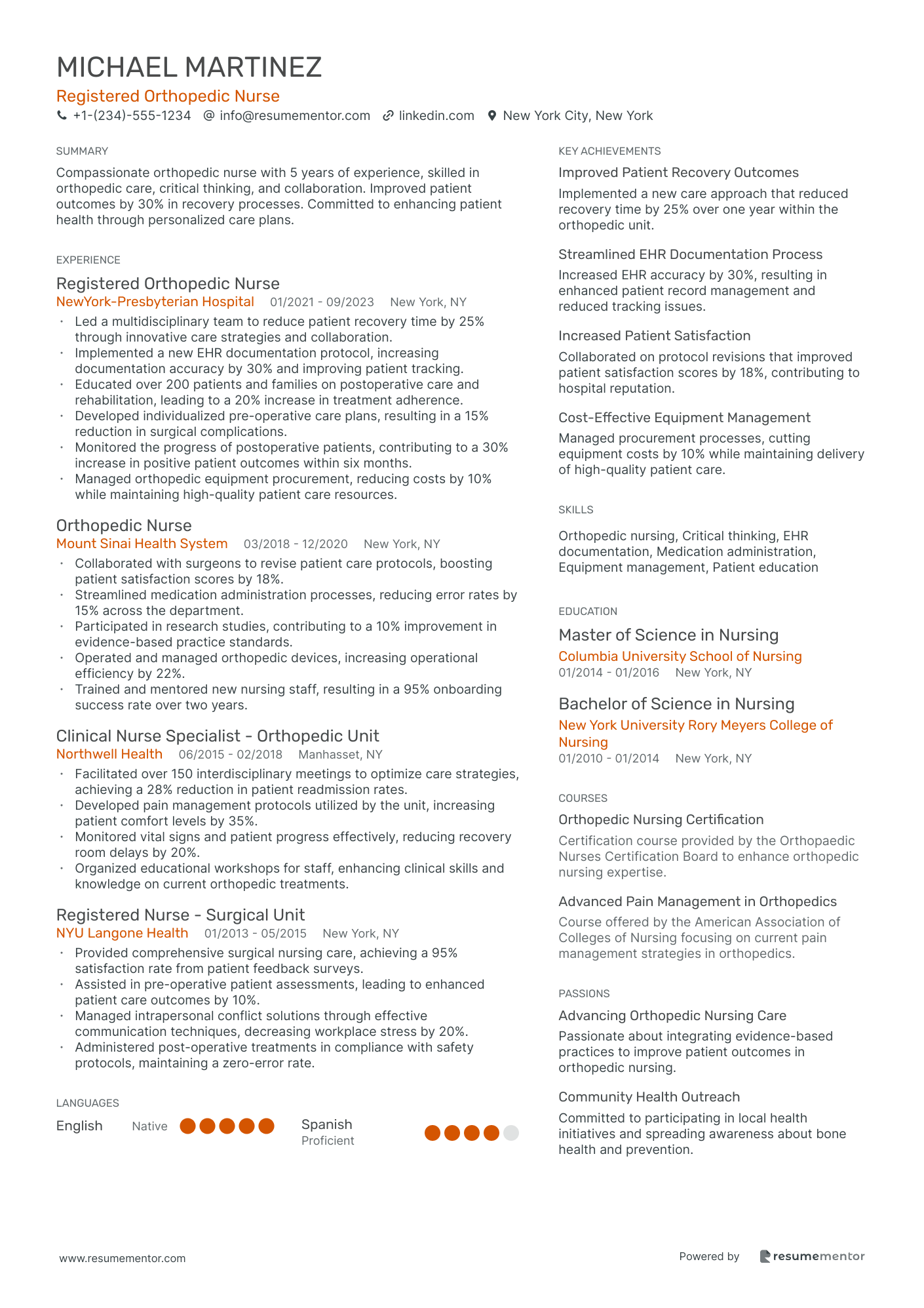
Registered Orthopedic Nurse
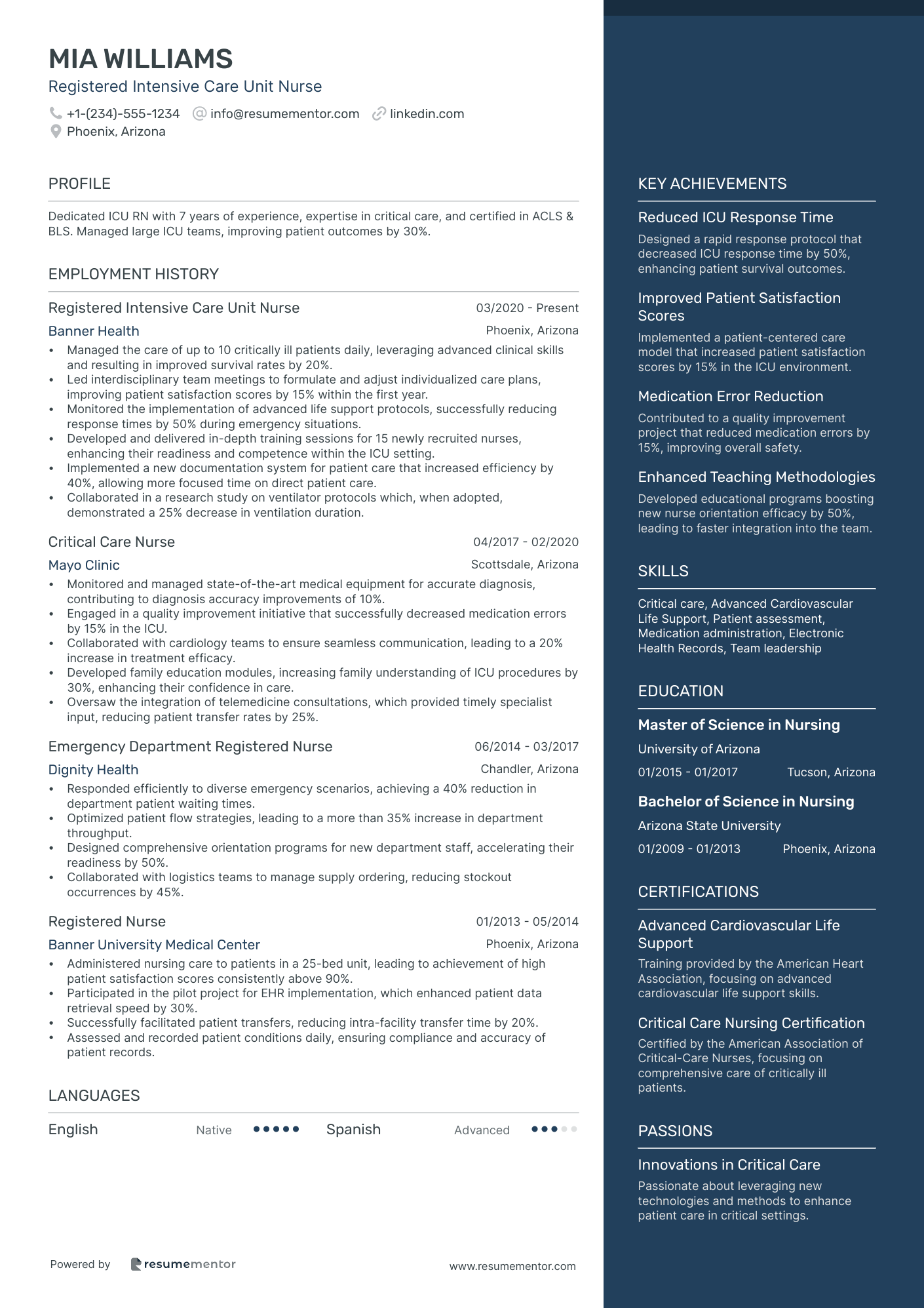
Registered Intensive Care Unit Nurse
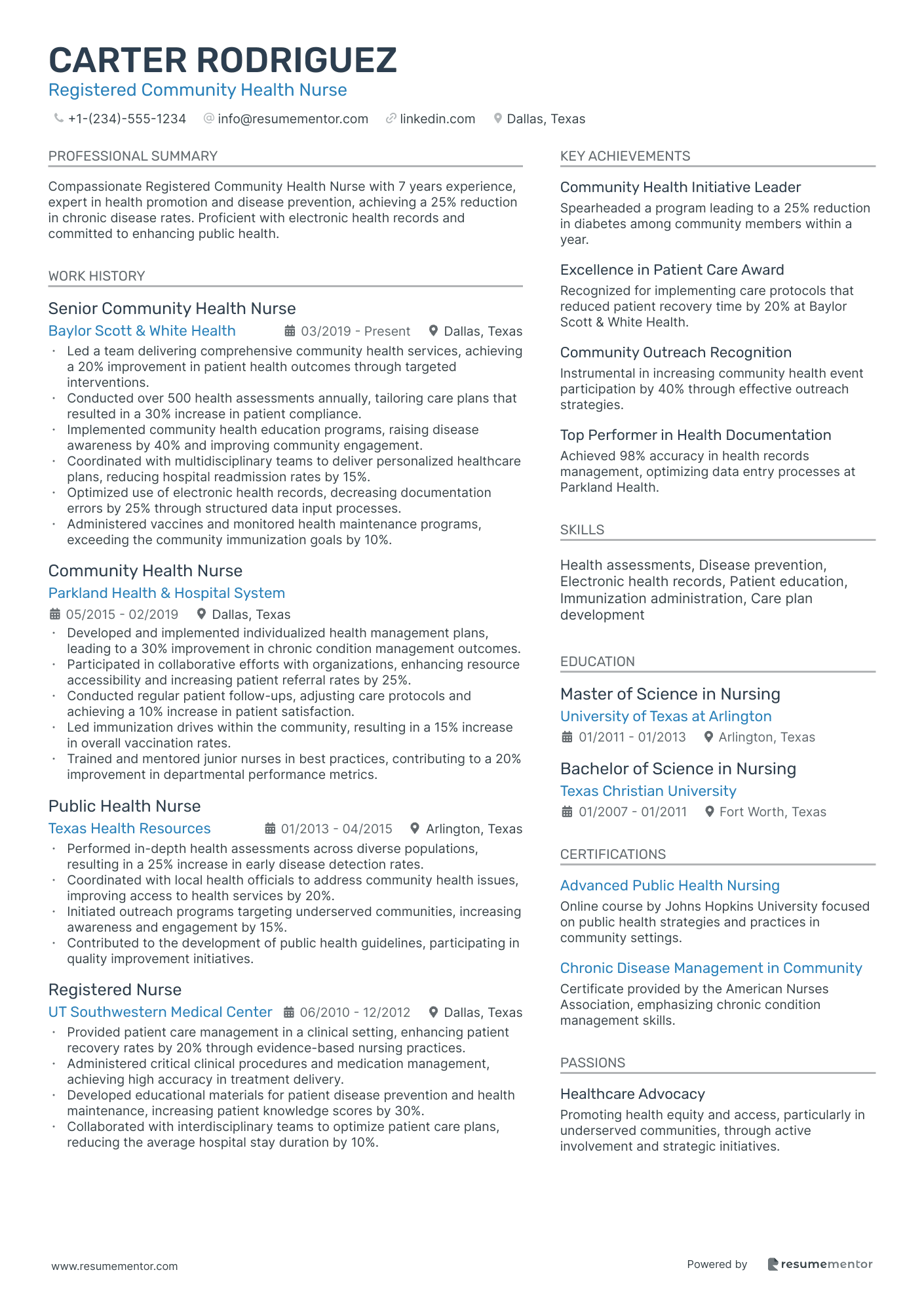
Registered Community Health Nurse

Registered Pediatric Nurse resume sample
- •Led a team project to standardize pediatric care plans, reducing medication errors by 15% and improving patient outcomes.
- •Collaborated with multidisciplinary teams to enhance patient care, achieving a 20% increase in patient satisfaction scores.
- •Implemented a child-friendly educational initiative for families on treatment procedures, improving comprehension by 30%.
- •Managed a caseload of up to 25 pediatric patients, focusing on assessments and tailored care plans.
- •Trained five new staff members in pediatric nursing protocols, increasing their proficiency and confidence.
- •Participated in clinical research to develop evidence-based practices, resulting in a 10% improvement in recovery times.
- •Coordinated with physicians to develop comprehensive nursing care plans, successfully reducing patient readmission rates by 12%.
- •Administered medications and treatments with zero tolerance for errors, resulting in outstanding safety compliance.
- •Monitored growth and development milestones, and reported findings that led to improved early intervention strategies.
- •Implemented a documentation system that increased the accuracy of patient records by 25%.
- •Acted as a mentor to nursing students, guiding them in pediatric nursing care best practices.
- •Provided educational support to families, improving adherence to care plans by 25%.
- •Performed comprehensive health assessments and communicated findings effectively to the healthcare team.
- •Fraud prevention initiative resulted in significant cost savings and process improvements for the department.
- •Developed a protocol for timely medication administration, optimizing patient recovery times.
- •Delivered high-standard nursing care to pediatric patients, consistently exceeding patient safety targets.
- •Established effective communication channels with families, boosting their satisfaction levels by 18%.
- •Contributed to departmental quality improvement projects, promoting evidence-based practice improvements.
- •Administered vaccinations and health screenings effectively to a diverse pediatric population.
Registered Geriatric Nurse resume sample
- •Led a team of 10 nursing staff, increasing patient satisfaction scores by 15% over 12 months.
- •Developed personalized care plans for 75+ elderly patients, improving treatment efficacy by 20%.
- •Reduced medication error rates by 10% through meticulous administration practices and staff training.
- •Coordinated with multidisciplinary teams, resulting in better health outcomes for 90% of patients.
- •Implemented a fall prevention program, cutting fall incidents by 30% in one year.
- •Educated families on geriatric care, boosting engagement in patient home care by 40%.
- •Managed care for 60+ patients, achieving a 92% adherence to treatment plans.
- •Implemented digital record-keeping systems, improving documentation accuracy by 25%.
- •Collaborated with physicians to tailor treatment, enhancing recovery rates for 85% of patients.
- •Provided expert advice in 15+ educational workshops, empowering families in elderly care.
- •Reduced average patient discharge time by 10% through streamlined processes.
- •Assessed and managed complex health issues in over 100 elderly patients, improving health metrics.
- •Tracked patient data, leading to personalized interventions and a 20% increase in patient health scores.
- •Led family support groups, increasing engagement in care activities by 35%.
- •Introduced a pain management protocol, decreasing patient-reported discomfort by 15%.
- •Provided direct nursing care to geriatric patients, boosting patient recovery rates by 30%.
- •Conducted thorough health assessments, identifying key health issues in 75% of cases.
- •Improved patient satisfaction scores by 10% through compassionate care and attention.
- •Participated in a hospital-wide initiative to reduce readmissions by 15% over 9 months.
Registered Oncology Nurse resume sample
- •Led a team to streamline treatment plans, reducing patient wait times in outpatient services by 30%.
- •Implemented chemotherapy protocols leading to a 15% increase in patient safety scores year-over-year.
- •Educated 150+ patients and families on immunotherapy, enhancing treatment adherence by 25%.
- •Collaborated with a multidisciplinary team on over 200 care plans, improving patient satisfaction scores by 18%.
- •Provided emotional and psychological support to patients, helping increase overall patient-reported wellness by 20%.
- •Successfully initiated patient tracking program that reduced missed appointments by 12% in the first year.
- •Assessed and monitored over 300 patients’ health status, contributing to a 25% decrease in emergency interventions.
- •Administered daily doses of chemotherapy to 500+ patients, maintaining an error-free administration record.
- •Developed educational materials on chemotherapy side effects, resulting in a 22% decrease in patient discomfort reports.
- •Participated in bi-weekly multidisciplinary team meetings to refine treatment protocols, enhancing clinical outcomes by 12%.
- •Piloted a patient feedback loop, increasing treatment program satisfaction scores by 18%.
- •Monitored 50+ oncology patients daily, contributing to a 20% improvement in patient recovery times.
- •Managed medication protocols for safe chemotherapy delivery resulting in a perfect compliance record.
- •Contributed to patient care meetings, innovating processes that improved discharge efficiency by 10%.
- •Facilitated patient workshops, enhancing awareness of treatment side effects and coping mechanisms by 35%.
- •Assessed patient health before treatments, which led to a 20% reduction in adverse chemotherapy reactions.
- •Coached junior staff and interns on oncology protocols, improving team performance KPIs by 15%.
- •Developed comprehensive reports for 200+ oncology patients, enhancing data accuracy by 18% during audits.
- •Maintained a safe treatment environment, contributing to 0 safety incidents during the employment period.
Registered Cardiovascular Nurse resume sample
- •Led a multidisciplinary team in improving cardiac rehabilitation protocols, increasing patient recovery rates by 25%.
- •Implemented a patient education initiative on medication adherence, reducing readmission rates by 15% within one year.
- •Performed over 200 ECGs monthly, identifying critical abnormalities, resulting in timely interventions and improved patient outcomes.
- •Collaborated with cardiologists to develop personalized care plans, enhancing patient satisfaction scores by 30%.
- •Administered IV therapy and clinical evaluations for post-operative cardiovascular patients, reducing adverse reactions by 20%.
- •Orchestrated training of 10 nursing staff in advanced cardiovascular procedures, enhancing team competency and performance.
- •Provided comprehensive care to a caseload of 50+ cardiovascular patients weekly, ensuring compliance with all safety standards.
- •Executed cardiovascular assessments and administered treatments, decreasing patient complication rates by 18%.
- •Pioneered a program educating families on lifestyle modifications, leading to a 22% improvement in patient health behaviors.
- •Maximized patient comfort post-surgery through compassionate care and advanced nursing interventions.
- •Collaborated in clinical research studies aiming to advance cardiovascular treatment methodologies, contributing groundbreaking findings.
- •Monitored vital signs and administered medications for cardiovascular patients, maintaining accurate and detailed records.
- •Assisted in 150+ cardiac catheterization procedures annually, enhancing team efficiency and safety compliance.
- •Developed nursing care plans, achieving a 20% improvement in individualized patient outcomes.
- •Conducted patient education seminars, empowering 500+ patients and families about cardiovascular care strategies.
- •Delivered primary nursing care, demonstrating strong leadership and patient advocacy skills.
- •Participated in the implementation of electronic medical records, improving clinical efficiency and data accuracy.
- •Managed a diverse patient caseload, prioritizing care based on medical urgency and condition complexity.
- •Facilitated patient recovery through targeted interventions, resulting in a 15% reduction in hospital stay duration.
Registered Mental Health Nurse resume sample
- •Led a team to implement revised medication management protocols, resulting in a 25% reduction in medication errors.
- •Conducted comprehensive mental health assessments, improving treatment accuracy and patient satisfaction by 30%.
- •Coordinated with multidisciplinary teams effectively, enhancing patient care plans and outcomes by 20%.
- •Executed group therapy sessions that improved coping skills in 75% of participants, leading to lower relapse rates.
- •Developed patient education programs, increasing awareness of self-management practices by 40%.
- •Provided empathetic crisis intervention to over 200 patients experiencing acute mental health issues annually.
- •Drove improvements in patient documentation processes, achieving a 35% increase in completion rates.
- •Facilitated training workshops for new staff, increasing team competency levels and decreasing onboarding time by 15%.
- •Led community outreach programs, increasing mental health service utilization by 40% in underrepresented areas.
- •Managed collaboration with families and external agencies, ensuring continuity of care for patient discharges.
- •Implemented evidence-based practices that enhanced recovery outcomes for patients with anxiety disorders by 25%.
- •Advanced patient care delivery by developing personalized care plans, leading to patient satisfaction levels increasing by 20%.
- •Spearheaded crisis intervention protocols adoption, enabling 50% faster response times to acute mental health crises.
- •Promoted mental health awareness, resulting in a significant 45% increase in patient mental health screenings.
- •Assisted in the development of a digital health initiative, enabling remote monitoring for over 100 patients across the region.
- •Enhanced therapeutic relationships with patients, reaching a 95% satisfaction rate in professional feedback surveys.
- •Streamlined mental health assessment procedures, increasing efficiency and patient throughput by 15%.
- •Led a project to update mental health policies which resulted in a 20% reduction in compliance issues.
- •Facilitated psychoeducation seminars that engaged over 500 attendees, enhancing community mental health literacy.
Registered Nurse Anesthetist resume sample
- •Led anesthesia care in over 500 surgical procedures annually, achieving a 98% patient satisfaction rating.
- •Pioneered the development of a comprehensive pre-anesthesia assessment protocol that improved preoperative preparation, reducing complication rates by 25%.
- •Collaborated with surgical teams to develop patient-specific anesthesia care plans, resulting in enhanced recovery outcomes.
- •Mentored and trained three cohorts of nursing staff and anesthesia students, fostering a learning environment that boosted technical skill development.
- •Enhanced the post-anesthesia diagnostic process through innovative monitoring techniques, raising postoperative efficiency by 30%.
- •Participated in quality improvement initiatives, improving compliance with safety standards by 15%.
- •Provided anesthesia during complex cardiac procedures, contributing to a 20% decrease in procedure-related complications.
- •Conducted over 350 pre-anesthesia assessments annually, contributing to more tailored patient care and satisfaction.
- •Acted as liaison between families and medical teams in postoperative situations, enhancing communication and trust.
- •Implemented an enhanced monitoring system that improved intraoperative stability, reducing adverse surgical events by 15%.
- •Participated in the documentation improvement committee, increasing accuracy and clarity in anesthesia records by 40%.
- •Delivered anesthesia services for both adult and pediatric surgical cases, contributing to a high-level of patient safety.
- •Improved patient recovery protocols with innovative pain management strategies, resulting in faster recovery times.
- •Developed and led workshops for nursing teams on anesthesia best practices, improving departmental efficiency and morale.
- •Enhanced compliance with regulatory and safety standards by introducing cutting-edge anesthesia techniques and guidelines.
- •Monitored patient vitals and provided critical support in surgical areas, maintaining an optimal environment for anesthesia administration.
- •Assisted in the development of interdisciplinary care plans, resulting in improved patient outcomes and lower complications.
- •Facilitated improved patient recovery by implementing enhanced pain management techniques specific to post-surgical procedures.
- •Contributed to a reduction in patient wait times by optimizing assessment and preparation processes in collaboration with surgical teams.
Registered Neonatal Nurse resume sample
- •Implemented new protocols that improved patient recovery times by 20% through coordinated care and effective team collaboration.
- •Led a team of 10 nurses, fostering professional growth while maintaining a patient satisfaction rate of 95%.
- •Developed family-oriented educational programs which resulted in a 25% increase in family engagement.
- •Collaborated with neonatologists to tailor individualized care plans, significantly reducing complications in neonatal patients.
- •Trained and mentored new staff, resulting in a 15% reduction in turnover rates among NICU nurses.
- •Streamlined documentation processes, improving record accuracy by 30% and enhancing decision-making efficiency.
- •Provided expert care to neonates suffering from a wide range of conditions, aligning with hospital best practices and quality standards.
- •Managed medication administration, achieving a 98% adherence to treatment charts and protocols.
- •Played a key role in a multidisciplinary team that reduced length of hospital stay by 10% for premature infants.
- •Educated new parents on proper techniques to care for NICU babies, enhancing knowledge and confidence levels by 40%.
- •Enhanced nurse-patient ratios through proactive scheduling solutions, improving overall unit performance.
- •Achieved an 85% patient recovery rate by implementing evidence-based practices and collaborative coordinated care.
- •Assisted in the development of patient care programs that enhanced family inclusion in medical procedures.
- •Facilitated specialized training workshops, boosting departmental skills and performance by 15%.
- •Spearheaded an initiative that successfully reduced medication errors by 50%, safeguarding patient safety and care quality.
- •Managed a caseload of pediatric patients, improving discharge processes and reducing readmission rates by 10%.
- •Conducted patient assessments and provided targeted care plans, leading to enhanced patient satisfaction.
- •Organized educational outreach programs for families, increasing awareness of the importance of preventive care.
- •Collaborated with healthcare teams to improve service delivery, enhancing patient care experiences.
Registered Orthopedic Nurse resume sample
- •Led a multidisciplinary team to reduce patient recovery time by 25% through innovative care strategies and collaboration.
- •Implemented a new EHR documentation protocol, increasing documentation accuracy by 30% and improving patient tracking.
- •Educated over 200 patients and families on postoperative care and rehabilitation, leading to a 20% increase in treatment adherence.
- •Developed individualized pre-operative care plans, resulting in a 15% reduction in surgical complications.
- •Monitored the progress of postoperative patients, contributing to a 30% increase in positive patient outcomes within six months.
- •Managed orthopedic equipment procurement, reducing costs by 10% while maintaining high-quality patient care resources.
- •Collaborated with surgeons to revise patient care protocols, boosting patient satisfaction scores by 18%.
- •Streamlined medication administration processes, reducing error rates by 15% across the department.
- •Participated in research studies, contributing to a 10% improvement in evidence-based practice standards.
- •Operated and managed orthopedic devices, increasing operational efficiency by 22%.
- •Trained and mentored new nursing staff, resulting in a 95% onboarding success rate over two years.
- •Facilitated over 150 interdisciplinary meetings to optimize care strategies, achieving a 28% reduction in patient readmission rates.
- •Developed pain management protocols utilized by the unit, increasing patient comfort levels by 35%.
- •Monitored vital signs and patient progress effectively, reducing recovery room delays by 20%.
- •Organized educational workshops for staff, enhancing clinical skills and knowledge on current orthopedic treatments.
- •Provided comprehensive surgical nursing care, achieving a 95% satisfaction rate from patient feedback surveys.
- •Assisted in pre-operative patient assessments, leading to enhanced patient care outcomes by 10%.
- •Managed intrapersonal conflict solutions through effective communication techniques, decreasing workplace stress by 20%.
- •Administered post-operative treatments in compliance with safety protocols, maintaining a zero-error rate.
Registered Intensive Care Unit Nurse resume sample
- •Managed the care of up to 10 critically ill patients daily, leveraging advanced clinical skills and resulting in improved survival rates by 20%.
- •Led interdisciplinary team meetings to formulate and adjust individualized care plans, improving patient satisfaction scores by 15% within the first year.
- •Monitored the implementation of advanced life support protocols, successfully reducing response times by 50% during emergency situations.
- •Developed and delivered in-depth training sessions for 15 newly recruited nurses, enhancing their readiness and competence within the ICU setting.
- •Implemented a new documentation system for patient care that increased efficiency by 40%, allowing more focused time on direct patient care.
- •Collaborated in a research study on ventilator protocols which, when adopted, demonstrated a 25% decrease in ventilation duration.
- •Monitored and managed state-of-the-art medical equipment for accurate diagnosis, contributing to diagnosis accuracy improvements of 10%.
- •Engaged in a quality improvement initiative that successfully decreased medication errors by 15% in the ICU.
- •Collaborated with cardiology teams to ensure seamless communication, leading to a 20% increase in treatment efficacy.
- •Developed family education modules, increasing family understanding of ICU procedures by 30%, enhancing their confidence in care.
- •Oversaw the integration of telemedicine consultations, which provided timely specialist input, reducing patient transfer rates by 25%.
- •Responded efficiently to diverse emergency scenarios, achieving a 40% reduction in department patient waiting times.
- •Optimized patient flow strategies, leading to a more than 35% increase in department throughput.
- •Designed comprehensive orientation programs for new department staff, accelerating their readiness by 50%.
- •Collaborated with logistics teams to manage supply ordering, reducing stockout occurrences by 45%.
- •Administered nursing care to patients in a 25-bed unit, leading to achievement of high patient satisfaction scores consistently above 90%.
- •Participated in the pilot project for EHR implementation, which enhanced patient data retrieval speed by 30%.
- •Successfully facilitated patient transfers, reducing intra-facility transfer time by 20%.
- •Assessed and recorded patient conditions daily, ensuring compliance and accuracy of patient records.
Registered Community Health Nurse resume sample
- •Led a team delivering comprehensive community health services, achieving a 20% improvement in patient health outcomes through targeted interventions.
- •Conducted over 500 health assessments annually, tailoring care plans that resulted in a 30% increase in patient compliance.
- •Implemented community health education programs, raising disease awareness by 40% and improving community engagement.
- •Coordinated with multidisciplinary teams to deliver personalized healthcare plans, reducing hospital readmission rates by 15%.
- •Optimized use of electronic health records, decreasing documentation errors by 25% through structured data input processes.
- •Administered vaccines and monitored health maintenance programs, exceeding the community immunization goals by 10%.
- •Developed and implemented individualized health management plans, leading to a 30% improvement in chronic condition management outcomes.
- •Participated in collaborative efforts with organizations, enhancing resource accessibility and increasing patient referral rates by 25%.
- •Conducted regular patient follow-ups, adjusting care protocols and achieving a 10% increase in patient satisfaction.
- •Led immunization drives within the community, resulting in a 15% increase in overall vaccination rates.
- •Trained and mentored junior nurses in best practices, contributing to a 20% improvement in departmental performance metrics.
- •Performed in-depth health assessments across diverse populations, resulting in a 25% increase in early disease detection rates.
- •Coordinated with local health officials to address community health issues, improving access to health services by 20%.
- •Initiated outreach programs targeting underserved communities, increasing awareness and engagement by 15%.
- •Contributed to the development of public health guidelines, participating in quality improvement initiatives.
- •Provided patient care management in a clinical setting, enhancing patient recovery rates by 20% through evidence-based nursing practices.
- •Administered critical clinical procedures and medication management, achieving high accuracy in treatment delivery.
- •Developed educational materials for patient disease prevention and health maintenance, increasing patient knowledge scores by 30%.
- •Collaborated with interdisciplinary teams to optimize patient care plans, reducing the average hospital stay duration by 10%.
Applying for new registered nurse positions? The first step is checking the vital signs of your resume. If this all-important document isn’t looking healthy, chances are, it’ll be harder to land your next interview. So, where should you start?
First, it’s worth understanding the ins and outs of this role. Don’t take your wide skill set for granted. You’re a steady hand in a crisis, the compassionate voice at a bedside, and the vital link between patients, families, and the wider care team.
Acing all of the above while working long, fast-paced shifts is far from easy. So, if you’re a pro, there are plenty of recruiters out there looking for someone with your skills and experience. However, you need to understand how to best show off these attributes.
The truth is that there’s a knack to creating a resume that stands out and catches recruiters’ attention. In this guide, we’ll be sharing top techniques to help you get started.
Key takeaways
- Know your audience: Don’t assume recruiters understand the intricacies of nursing—use clear, simple language and avoid jargon. Focus on keywords they’re likely scanning for in ATS systems.
- Emphasize certifications: Highlight essential certifications like BLS, ACLS, and NCLEX-RN prominently to prove you're qualified and ready to work in critical settings.
- Showcase specializations: If you have experience in a niche like pediatrics, geriatric care, or obstetrics, feature that early on to stand out from generalist candidates.
- Keep communication clear: Nursing hinges on communication. Reflect this by using a clean layout and straightforward resume language.
- Make your experience quantifiable: Use bullet points to list achievements with impact—such as patient load handled or improvements in patient satisfaction scores.
- Tailor your skills: Review the job posting and echo the language in your skills section. Focus on both hard skills like EHR proficiency and soft skills like conflict resolution.
- Include licensure and education: Always list your degree, GPA (if over 3.5), and state licensure. Certifications like CNOR or RNC-OB can elevate your profile even further.
- Add extra value: Sections like languages spoken or volunteer nursing work can set you apart, especially in multicultural or underserved healthcare settings.
How to use this registered nurse resume guide
Before we take a look at how to write a clear registered nurse resume, you need a few pointers. So that you can make the most out of this guide, we’ve put together a list of “must-dos” for you. Follow the checklist below to make sure that you know how to use our resources.
Guide checklist
- Start with the essentials
Get familiar with the key sections and must-have skills that make a registered nurse resume stand out to hospitals, clinics, and healthcare recruiters. - Highlight your strengths
Stand out by showcasing your clinical expertise, patient care experience, and ability to thrive in fast-paced medical environments. - Build out your core sections
Start your resume by including vital areas like certifications, clinical experience, nursing education, and licensure. - Use our expert advice and insights
Our guide goes beyond generic advice. Explore our pro tips for trusted, nurse-specific guidance to help you craft a compelling resume. - Tailor your resume to the role
Customization can make a big difference. Emphasize patient advocacy, care planning, interdisciplinary collaboration, and outcomes-focused nursing practice. - Know where to research careers
Use reliable job boards like Nurse.org, ANA Career Center, and Health eCareers to understand what top employers are looking for. - Stand out with certifications
Add credentials like RN licensure, ACLS, BLS, and specialty certifications (e.g., CCRN, CNOR), plus EMR/EHR system skills. - Build your resume effortlessly
Finally, use our drag-and-drop resume builder. The simple tool helps you format your resume with ease—no stress, just results.
Is your resume good enough?
Drop your resume here or choose a file.
PDF & DOCX only. Max 2MB file size.
What to focus on when writing your registered nurse resume
Don’t presume the recruiter understands what you do. The professional who sifts your resume, may not have a solid grasp on what a registered nurse role entails. Instead, they’ll be looking for certain keywords and phrases from a checklist. Make sure that your resume hits the mark.
Deciding what to focus on is the first step here. While there are many different angles you can take, we recommend one of the following options for success.
- Specific certifications (e.g., BLS, ACLS)
- Specialized skills (e.g., pediatric care, geriatric care)
- Relevant technology proficiencies (e.g., EMR/EHR systems)
- Clear, straightforward communication
Give the recruiter some cold, hard facts
You’ll be up against a ton of registered nurses with similar experience to you. If you want to set yourself apart from the crowd—and you should—include metrics in your resume.
For example, “Delivered compassionate, evidence-based care to 20+ patients per shift in a high-acuity surgical unit, ensuring timely assessments and interventions” sounds way better than simply “Delivered compassionate, evidence-based care.”
If you’re not sure which angle to take, we’ve got you covered—let’s take a look at each of them below:
Shout about your specific certifications
As a registered nurse, you’ll need the US Nursing Licensure to practice. However, there are plenty of other qualifications you can gain that’ll give you a competitive edge.
Let’s take a look at some of the most in-demand certificates:
Demonstrate your specialized skills
What’s your specialism? Show the recruiter that you have a clear niche and you’re likely to be more memorable. Whether it’s pediatric care or geriatric care, it’s likely that your field will have its own set of rules.
Show some personality! If you’ve chosen a certain niche—such as geriatric care—tell the recruiter what drew you to that area. Your resume summary gives you a chance to do this.
Here’s an example of how that may look:
Proficiency with relevant technology
Technology is at the forefront of the healthcare sector. When you’re writing your registered nurse resume, let the recruiter know which tech you’re proficient in using.
First and foremost, add these proficiencies to your skills section. However, you should also mention them in your work experience to add some context.
Here are some examples:
- Electronic Health Records (EHR) Systems (e.g., Epic, Cerner, Allscripts)
- Medical Devices (e.g., infusion pumps, ventilators, pulse oximeters)
- Clinical Decision Support Systems (CDSS)
- Telemedicine Platforms (e.g., Teladoc, Amwell)
- Medication Administration Systems (e.g., Pyxis, Omnicell)
- Hospital Information Systems (HIS)
- Patient Portals (e.g., MyChart)
Keep your communication clear
Nurses work directly with patients and other healthcare professionals. Communication is the cornerstone of this job. You need to be able to speak to people on their level and clearly share potentially complex ideas.
To show the recruiter you have what it takes, ensure your resume is straightforward. Avoid using too much jargon and keep the phrases simple. Choose a simple resume layout, too.
Now that you understand which angle to take, let’s move on to building your resume. The first step here is to choose an appropriate format for your needs.
How to choose the right resume format
Your resume format dictates how the content looks on the page. It’ll give you an obvious structure you can follow.
Here are the three main format types to consider:
- Reverse-chronological format: If you have a linear work history.
- Functional format: If you’ve switched careers or are new to nursing.
- Combination format: If you want the best of both worlds.
Typically, we recommend a reverse-chronological structure. This format starts with your most recent accolades at the top of the page and goes back in time. It’s the most common type of format and—as a major bonus—it’s what recruiters expect to see.
However, resumes are rarely one-size-fits-all. If you’d rather highlight your skills over your work history, it’s worth looking at either a functional or a combination format.
Which resume format should registered nurses use?
Typically, you should use the standard reverse-chronological format.
However, if you have more skills than you have experience, you may want to use a functional format instead.
Should I include a photo on my resume?
The short answer is no.
Registered nurses don’t need to add photos to their resumes.
What file format should I use for my resume?
We recommend saving your resume as a PDF rather than a Word document.
This looks more professional. However, it also means that your document can’t be edited by anyone else.
Can I design a resume in Word?
Technically, the answer is yes. However, getting the formatting right can be tricky. You might not get the professional style you want.
How big should my resume margins be?
Your resume margins need to be between 0.5 to 1 inch. That way, your resume will be easy to read.
When you’ve sorted out the structure of your registered nurse resume, the next step is conquering the content.
What to include in your resume header
Resume headers are vital to your success. If you wow the recruiter with your resume, they’ll want to get in touch fast. Make it easy for them.
Your header should include:
- Your name: Your full first and last name.
- Job title: The job title—in this case “Registered Nurse.”
- Contact details: A professional email address and your phone number.
- Location: Your city and state (rather than your full address).
Let’s take a look at an example:
How to write a resume summary
Now that you’ve got the basics down, it’s time to write an eye-catching resume summary. This is often the first thing that a recruiter will read. Finding a “hook” is an absolute must.
What is a 'hook'?
This is the one thing that sets you apart from other candidates. Take the time to consider what makes your nursing career unique.
Here are some examples:
- Exceptional experience
You might have more than a decade’s worth of experience as a registered nurse. You may want to lead with this crucial nugget.
- Awards and training
Have you received any awards or specialist nursing training? If so, now is the time to brag about it. Don’t be afraid to stand out.
- Remarkable statistics
Do you have an amazing track record? Share your most remarkable statistics in your resume summary and make a real impact.
When you’ve chosen what you want to include, make sure you get the language right. Using resume action words is a quick way to get the attention you deserve.
Here’s an example to give you some inspiration:
This summary clearly outlines what makes the candidate special. Focusing on their Critical Care Nursing (CCU) experience and expert training, it’s clear, concise, and engaging.
How to write a quantifiable resume experience section
Next, you’ll need to add some work experience to your resume. You should use the reverse chronological order when listing your prior roles.
Start by writing down the company name, location, role, and dates of employment. When you’ve covered the basics, use bullet points to highlight your achievements.
Use numbers
Show your value with metrics. When you’re listing your achievements, quantify them. By adding statistics and numbers into the mix, you show the recruiter what you’re capable of.
Do you want to know how far back to go on your resume? Ideally, you should go back between 10 and 15 years in the past. If you’ve been working for longer than that, just start with your most recent experience. This will protect you from accidental age discrimination.
Here’s an example so you can see what we mean:
- •Provided care for over 200 critically ill patients annually, ensuring safe and effective treatments while maintaining a 98% patient satisfaction score.
- •Collaborated with a multidisciplinary team to reduce ICU readmission rates by 30% over the past year.
- •Administered emergency interventions and assisted in life-saving procedures, achieving a 95% survival rate for trauma patients.
- •Monitored patient vital signs using advanced telemetry systems and made real-time adjustments to care plans to improve patient outcomes.
- •Successfully managed care for 15-20 patients per shift in a high-volume medical surgical unit.
- •Improved patient recovery time by 20% through the implementation of enhanced pain management strategies.
- •Educated patients and families on post-surgical care, resulting in a 15% decrease in readmissions for preventable complications.
- •Worked closely with surgical teams to monitor patient progress and coordinate treatment adjustments as necessary.
Remember, your work experience section should tell a clear story. Maybe you started as a generalist registered nurse and later specialized in geriatric care. Whatever the case, make your history compelling to the reader.
Registered nurse resume work experience samples
When writing your registered nurse resume, you need to play to your professional strengths. If you want to really make an impact, consider choosing a central focus. What makes you shine?
Here are three examples you might consider:
Results focused
Do you consistently deliver top results? Registered nurses need to be quick to react to situations and have a great track record. Add key metrics to your work experience.
- •Managed critical care for 200+ patients annually, reducing response time to patient emergencies by 25% through faster triage and intervention protocols.
- •Improved patient recovery rates by 20% by accelerating post-operative care processes and enhancing discharge planning.
- •Achieved a 98% patient satisfaction rate by reducing wait times for medications and procedures by 15% through optimized workflow management.
- •Collaborated in a team effort that reduced ICU readmission rates by 30% within one year by implementing quicker, more effective patient monitoring systems.
- •Delivered care to 15-20 patients per shift, reducing average discharge time by 18% through quicker pain management and recovery procedures.
- •Reduced post-surgical complications by 25% by speeding up the identification and treatment of wound infections within the first 48 hours of surgery.
- •Improved overall patient recovery speed by 20% by streamlining the education process for discharge, ensuring patients felt prepared and confident about their recovery plan.
- •Enhanced patient flow by decreasing room turnover time by 10% through more efficient patient assessments and discharge planning.
Niche focused
Do you work in a specialist area? Let the recruiter know you have hands-on experience in that sector. This approach is a savvy way to get ahead of generic applicants.
- •Managed care for 150+ elderly patients per year, reducing readmission rates for chronic conditions by 20% through early intervention and tailored care plans.
- •Reduced patient transfer times by 30% through the implementation of a streamlined medication and mobility tracking system.
- •Achieved a 25% improvement in mobility outcomes by accelerating physical therapy protocols and enhancing patient education for home-based care.
- •Collaborated in a team effort that reduced emergency room visits by 15% through the early identification and management of geriatric syndromes, such as delirium and falls.
- •Assisted in the care of 20+ elderly patients per shift, reducing the occurrence of hospital-acquired infections by 18% through rigorous infection control measures.
- •Improved patient mobility by 15% in 6 months by implementing faster rehabilitation protocols and improving collaboration with physical therapists.
- •Decreased falls by 25% by introducing a more rapid-response alert system for at-risk patients, reducing response time to mobility assistance needs.
- •Enhanced pain management plans, reducing average time to pain relief by 20%, improving patient comfort and overall satisfaction.
Tech focused
Healthcare runs on technology. If you have a knack for it, that makes you a valuable candidate. Name-check the software, tools, and other technology you’re confident in using.
- •Improved patient data access and reduced documentation time by 20% through advanced EHR systems (Epic, Cerner), enabling quicker clinical decision-making.
- •Reduced emergency response times by 15% through the integration of smart patient monitoring systems, providing real-time health data to nursing staff.
- •Decreased patient wait times for consultations by 30% by implementing telemedicine platforms (Amwell, Teladoc), facilitating remote consultations and follow-up care.
- •Collaborated with IT teams to introduce digital prescribing systems, reducing medication errors by 18% and improving prescription accuracy.
- •Improved medication administration accuracy by 25% by implementing BCMA technology, ensuring patient safety and reducing medication errors.
- •Utilized mobile health apps (e.g., MyChart, Medscape) to assist in patient education, improving patient compliance with discharge instructions by 20%.
- •Enhanced patient communication and follow-up care through telehealth platforms, reducing in-person follow-ups by 18% and improving continuity of care.
- •Introduced wearable health devices to monitor patient vitals, resulting in a 15% reduction in response time for critical condition alerts.
Listing your skills on your resume
You’ve already shared your experience. Next, you need some skills on your resume. Now, you likely have a whole range of nursing skills you want to shout about.
However, it pays to be selective. Choosing the right skills for this specific vacancy shows the recruiter you’re a top candidate. It’s all about speaking their language.
First up, go back to the job posting and analyze it. If the recruiter has highlighted any “must-haves,” you must have them. List them in your skills section.
Your core competencies should consist of both hard and soft skills. You’ll want to bullet point any tech you use, the training you have, and interpersonal skills, too.
Let’s take a look at a great nursing skill section:
Best hard skills to feature on your registered nurse resume
Hard skills are at the core of everything you do as a registered nurse. These are the traits you’ll have learned during your essential training. However, you may have undertaken extra courses to specialize in certain areas.
Here’s an example of a hard skills section:
Best soft skills to feature on your registered nurse resume
The technical side of nursing is one thing. But being able to get along with patients is quite another. Show that you have a real bedside manner in your resume.
Choose soft skills that support this side of your personality. These may include communication, interpersonal skills, and conflict resolution.
Let’s take a look at some of the top soft skills for nurses:
Education on resume
As a registered nurse, you already know the value of qualifications. When you’ve completed your skills section, move on to your education resume section.
You should include three types of education in this part:
Formal education
Registered nurses typically need to have a college degree. This means an Associate Degree in Nursing (ADN), a Bachelor of Science in Nursing (BSN), or a Diploma in Nursing.
To bolster your application, include:
Nurse licensure
When you’ve completed your degree, the next step is passing the National Council Licensure Examination for Registered Nurses (NCLEX-RN). Of course, this accreditation belongs in your education section.
Specialisms and certificates
Learning is a lifelong experience. Once you’re registered, there are plenty ofprofessional certifications you can get to become even more qualified. Which you have depends on the area of nursing that you intend to go into and your main talents.
For example, you may have the following:
- Inpatient Obstetric Nursing (RNC-OB)
- Certified Nurse Operating Room (CNOR)
- Clinical Nurse Specialist Board Certification (CNS-BC)
- Advanced Cardiovascular Life Support (ACLS)
- Certified Pediatric Oncology Nurse (CPON)
Check out our education section example below:
Extra sections to include in your registered nurse resume
By this point, your registered nurse resume should be looking pretty healthy. Adding some extra resume sections could help you take it to the next level.
If you have some space to spare, there are a few options you might want to think about.
Language section
Chances are, you’ll deal with patients from all walks of life. Having a second language on your resume is a real advantage. Why not put a language section on the page?
Hobbies and interests section
Looking for a quick way to humanize yourself to the recruiter? Adding hobbies to your resume could be it. Include interests that show your interpersonal skills.
Volunteer work section
Volunteer work is highly valuable in nursing, especially if you’re new to the career. This section looks a lot like your work experience section but includes volunteer posts.
- •Provided first aid, health screenings, and emergency support during local disaster relief efforts.
- •Assisted with blood drives, offering post-donation care and monitoring vital signs.
- •Educated community members on basic health practices and emergency preparedness.
PRO TIP
Avoid repetition in your resume. Once you’ve done your first draft, go back and look for any repeated words or even phrases. Cutting these out will make the content more dynamic.
Conclusion
Your registered nurse resume is your first opportunity to stand out—so make it count. By showcasing your certifications, clinical expertise, and specialized skills with clear, measurable results, you can position yourself as a top candidate in a competitive field. Use this guide to craft a confident, focused, and impactful resume that reflects your strengths and sets you apart.
Ready to take the next step in your nursing career? Let’s build that winning resume today. Use our drag-and-drop resume builder tool and make your next applications quickly and easily.
Related Articles

Continue Reading
Check more recommended readings to get the job of your dreams.
Resume
Resources
Tools
© 2026. All rights reserved.
Made with love by people who care.

